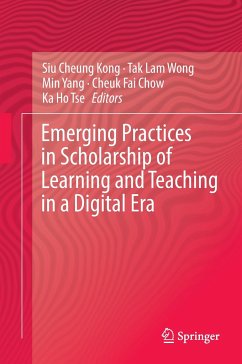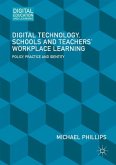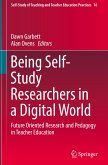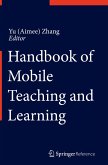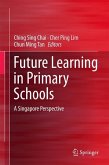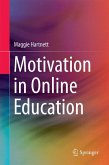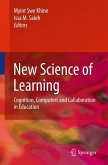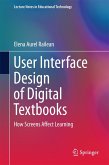Emerging Practices in Scholarship of Learning and Teaching in a Digital Era
Herausgegeben:Kong, Siu Cheung; Wong, Tak Lam; Yang, Min; Chow, Cheuk Fai; Tse, Ka Ho
Emerging Practices in Scholarship of Learning and Teaching in a Digital Era
Herausgegeben:Kong, Siu Cheung; Wong, Tak Lam; Yang, Min; Chow, Cheuk Fai; Tse, Ka Ho
- Gebundenes Buch
- Merkliste
- Auf die Merkliste
- Bewerten Bewerten
- Teilen
- Produkt teilen
- Produkterinnerung
- Produkterinnerung
In this book, we put forward a holistic conceptual framework for implementing Scholarship of Learning and Teaching (SoLT) in higher education. Unlike previous SoLT studies, which usually focus on a specific aspect, here various aspects are integrated into a holistic framework. Further, it identifies three main stakeholders, namely, the higher education institution, teaching staff, and students. These stakeholders are in turn connected by four interlocking themes: staff professional development, enhancement of student learning experiences, assessment, and digital technologies.
Presenting…mehr
Andere Kunden interessierten sich auch für
![Digital Technology, Schools and Teachers' Workplace Learning Digital Technology, Schools and Teachers' Workplace Learning]() Michael PhillipsDigital Technology, Schools and Teachers' Workplace Learning39,99 €
Michael PhillipsDigital Technology, Schools and Teachers' Workplace Learning39,99 €![Being Self-Study Researchers in a Digital World Being Self-Study Researchers in a Digital World]() Being Self-Study Researchers in a Digital World66,99 €
Being Self-Study Researchers in a Digital World66,99 €![Handbook of Mobile Teaching and Learning Handbook of Mobile Teaching and Learning]() Handbook of Mobile Teaching and Learning254,99 €
Handbook of Mobile Teaching and Learning254,99 €![Future Learning in Primary Schools Future Learning in Primary Schools]() Future Learning in Primary Schools39,99 €
Future Learning in Primary Schools39,99 €![Motivation in Online Education Motivation in Online Education]() Maggie HartnettMotivation in Online Education70,99 €
Maggie HartnettMotivation in Online Education70,99 €![New Science of Learning New Science of Learning]() New Science of Learning116,99 €
New Science of Learning116,99 €![User Interface Design of Digital Textbooks User Interface Design of Digital Textbooks]() Elena Aurel RaileanUser Interface Design of Digital Textbooks39,99 €
Elena Aurel RaileanUser Interface Design of Digital Textbooks39,99 €-
-
-
In this book, we put forward a holistic conceptual framework for implementing Scholarship of Learning and Teaching (SoLT) in higher education. Unlike previous SoLT studies, which usually focus on a specific aspect, here various aspects are integrated into a holistic framework. Further, it identifies three main stakeholders, namely, the higher education institution, teaching staff, and students. These stakeholders are in turn connected by four interlocking themes: staff professional development, enhancement of student learning experiences, assessment, and digital technologies.
Presenting chapters that address these four themes, this book supports the advancement of SoLT in higher education in relation to existing theories and emerging practices. By helping academics and leaders in higher education to implement SoLT for the improvement of student learning and teaching practices, it also makes a valuable contribution to the field of teacher education.
Presenting chapters that address these four themes, this book supports the advancement of SoLT in higher education in relation to existing theories and emerging practices. By helping academics and leaders in higher education to implement SoLT for the improvement of student learning and teaching practices, it also makes a valuable contribution to the field of teacher education.
Produktdetails
- Produktdetails
- Verlag: Springer / Springer Nature Singapore / Springer, Berlin
- Artikelnr. des Verlages: 978-981-10-3342-1
- 1st ed. 2017
- Seitenzahl: 384
- Erscheinungstermin: 1. März 2017
- Englisch
- Abmessung: 241mm x 160mm x 27mm
- Gewicht: 684g
- ISBN-13: 9789811033421
- ISBN-10: 9811033420
- Artikelnr.: 46972195
- Herstellerkennzeichnung Die Herstellerinformationen sind derzeit nicht verfügbar.
- Verlag: Springer / Springer Nature Singapore / Springer, Berlin
- Artikelnr. des Verlages: 978-981-10-3342-1
- 1st ed. 2017
- Seitenzahl: 384
- Erscheinungstermin: 1. März 2017
- Englisch
- Abmessung: 241mm x 160mm x 27mm
- Gewicht: 684g
- ISBN-13: 9789811033421
- ISBN-10: 9811033420
- Artikelnr.: 46972195
- Herstellerkennzeichnung Die Herstellerinformationen sind derzeit nicht verfügbar.
Prof Siu Cheung Kong is currently a Professor at the Department of Mathematics and Information Technology and Director of the Centre for Learning, Teaching and Technology, the Education University of Hong Kong. Prof Kong is also Editor-in-Chief of the international journals Research and Practice in Technology Enhanced Learning (RPTEL) and Journal of Computers in Education (JCE). Dr Tak-Lam Wong received his Ph.D. from the Chinese University of Hong Kong. His research focuses on the areas of information retrieval, machine learning and learning technologies. He has published papers in IEEE TPAMI, IEEE TKDE, ACM TOIS, etc. and is the current Chair of IEEE HK Section Computer Society Chapter. As a certified teacher, Dr Wong delivers professional development training courses for teachers. Dr Min Yang is an Assistant Professor in curriculum and instruction at the Education University of Hong Kong. Her primary research interests are in effective assessment and teaching strategies in higher education, as well as student experience and learning inside and outside the classroom. Her publications have appeared in several reputable international journals. Dr Cheuk Fai Chow is an Associate Professor at the Education University of Hong Kong (EdUHK) and has been involved in environmental education and science for over a decade. He received a Croucher Foundation Fellowship and did his post-doctoral fellowship with Nobel laureate Jean Marie Lehn. He has published 50 international refereed journal papers and filed two patents. Dr Ka Ho Tse is an Associate Professor of Chinese Language Studies at the Education University of Hong Kong (EdUHK). His main research interests are knowledge transfer for information technologies in language teaching, as well as the pedagogy of learning and teaching. Dr Tse is a former vice-chairman and current committee member of the Association of Modernization of Chinese Language Education.
1 Towards a Framework of Studying Scholarship of Learning and Teaching in Higher Education in a Digital Technology Era.- Part I Staff Professional Development.- 2 Community of Practice: Building a Mobile Learning Community in a Higher Education Institution to Promote Effective Teaching and Learning.- 3 Learning to Engage the Digital Generation in Teacher Education.- 4 Technology Integration for Student-Centered Learning: A Model for Teacher Professional Development Programs.- 5 Development of an Effective Staff Professional Development for the Enhancement of Student Learning.- 6 Leveraging Knowledge through Communities of Practice.- 7 Affordances and Constraints of BYOD (Bring Your Own Device) for Learning in Higher Education: Teachers' Perspectives.- Part II Enhancement of Student Learning Experience.- 8 Plastic Waste Problem and Education for Plastic Waste Management.- 9 An Interactive Conceptual Approach to Support the Teaching and Learning of Green Technology.- 10 The Unconventional Learning Experience of Students: Becoming a Courier of Marine Stewardship.- 11 Developing Undergraduates' Self-management and Self-awareness Abilities through Service-learning.- 12 Teaching and Learning of Literacy Criticism and Creative Writing.- 13 Autonomous Vocabulary Learning beyond the Classroom: New Media for Learners of Chinese as a Second Language.- 14 Learning the use of "Irony" from the Perspective of Theory of Literature: A Case Study using Wang Meng's The Stubborn Porridge.- 15 An Approach to Facilitate Coherent Concept Image Formation via Guided Reinvention.- Part III Assessment.- 16 Constructing Formative Assessment Strategies.- 17 Formative Feedback as a Global Facilitator: Impact on Intrinsic and Extrinsic Motivation and Positive Affect.- 18 Using ICT to Facilitate Instant and Asynchronous Feedback for Students' Learning Engagement and Improvements.- 19 Using Feedback Strategies to Support First-year Students' Independent Learning and Critical Judgement.- 20 Embedding Feedback in Learning and Assessment Tasks to Support Students' Professional Learning.- 21 Implementing the Assessment of the Generic Attributes of Students through Self-assessment Survey and ePortfolios at a Higher Education Institution.- Part IV Conclusion.- 22 Scholarship of Learning and Teaching in a Digital Era: The Way Foreword.
1 Towards a Framework of Studying Scholarship of Learning and Teaching in Higher Education in a Digital Technology Era.- Part I Staff Professional Development.- 2 Community of Practice: Building a Mobile Learning Community in a Higher Education Institution to Promote Effective Teaching and Learning.- 3 Learning to Engage the Digital Generation in Teacher Education.- 4 Technology Integration for Student-Centered Learning: A Model for Teacher Professional Development Programs.- 5 Development of an Effective Staff Professional Development for the Enhancement of Student Learning.- 6 Leveraging Knowledge through Communities of Practice.- 7 Affordances and Constraints of BYOD (Bring Your Own Device) for Learning in Higher Education: Teachers' Perspectives.- Part II Enhancement of Student Learning Experience.- 8 Plastic Waste Problem and Education for Plastic Waste Management.- 9 An Interactive Conceptual Approach to Support the Teaching and Learning of Green Technology.- 10 The Unconventional Learning Experience of Students: Becoming a Courier of Marine Stewardship.- 11 Developing Undergraduates' Self-management and Self-awareness Abilities through Service-learning.- 12 Teaching and Learning of Literacy Criticism and Creative Writing.- 13 Autonomous Vocabulary Learning beyond the Classroom: New Media for Learners of Chinese as a Second Language.- 14 Learning the use of "Irony" from the Perspective of Theory of Literature: A Case Study using Wang Meng's The Stubborn Porridge.- 15 An Approach to Facilitate Coherent Concept Image Formation via Guided Reinvention.- Part III Assessment.- 16 Constructing Formative Assessment Strategies.- 17 Formative Feedback as a Global Facilitator: Impact on Intrinsic and Extrinsic Motivation and Positive Affect.- 18 Using ICT to Facilitate Instant and Asynchronous Feedback for Students' Learning Engagement and Improvements.- 19 Using Feedback Strategies to Support First-year Students' Independent Learning and Critical Judgement.- 20 Embedding Feedback in Learning and Assessment Tasks to Support Students' Professional Learning.- 21 Implementing the Assessment of the Generic Attributes of Students through Self-assessment Survey and ePortfolios at a Higher Education Institution.- Part IV Conclusion.- 22 Scholarship of Learning and Teaching in a Digital Era: The Way Foreword.

